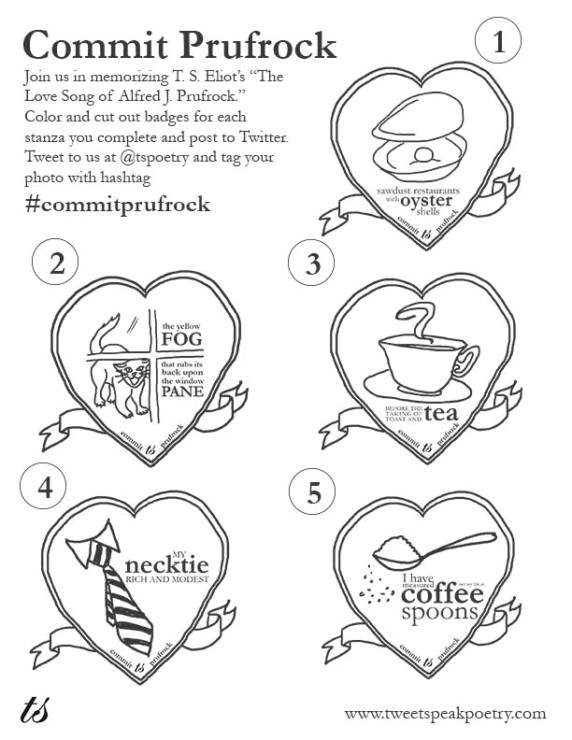
I grow old . . . I grow old . . . Who starts memorizing poetry at my age?
If someone had told me a year ago that I’d be memorizing swaths of poetry now—on purpose—starting with a 131-line T.S. Eliot poem, I might have rolled up the bottoms of my white girlfriend jeans and run muttering down our country road. But someone dared to disturb my universe. Who knew I’d find myself settling a pillow or walking down the beach or floating on waves while reciting chunks of verse?
How did I do it?
So far I haven’t had the patience to conjure up fantastical images like many memory champions. I didn’t stock a memory palace, an imaginary building in my mind where I could “cubbyhole” those images like the ancients did. I memorized (this time) mostly by rote and repetition. I wrote words out. I also let the poem come alive in my head. I visualized my own picture of what was happening in each verse. I did create images for prepositions or transition words (like a witch flying on a broom for “which” or a mermaid sitting on a large piece of driftwood for “should” as opposed to a mermaid with a shawl draped over her head for “shall.”) I don’t dream of ever entering some kind of memory competition. My collection of barista badges is enough for me.
I have done it.
I have committed Prufrock. And I live to tell about it, though I can’t drink a cup of tea or eat a peach or a piece of toast without thinking about him. Okay, so I’m still working on that Italian epigraph, but it’s committed, and it’s been worth it after all. How so?
I feel proud.
If I could stretch my unbraceleted, lightly downed and wavy-skinned arm far enough past my stiff shoulder joint, I’d pat myself firmly on the back. I’ll settle for tapping myself on the nape of my neck because—I did it. I said I would, though I wasn’t sure I could, but I did. Maybe not perfectly. Maybe not exactly word for word. Maybe not the Italian—yet. But, I combed the hair of this poem back and stood tall for video selfie recitations in the sun. I fired up the old neurons, and I’m pretty sure I grew some new ones. I’ll even bet I have some broader brainy connections. I went on an adventure and proved to myself that my age is no barrier to learning new things. What else might I be able to do?
I feel literary.
I seriously memorized The Love Song of J. Alfred Prufrock. I reminisced with Tom (we had a bit of a fling a few years back) and delved into Dante’s Inferno. I read some study guides and summaries and slipped around Shakespeare and Andrew Marvell and John Donne and other poets that those more literary than I am think Eliot alludes to. Whoever wrote the stanza IV summary for Schmoop said:
“Eliot knew a lot about literature. He read more books than almost any other writer in the 20th century—maybe more than any other writer, period. He could make subtle references to all kinds of literary figures without even trying. His brain worked like that. Good for him.
“But you don’t have to ‘get’ these references to understand his poems. Sometimes, though, they are fun to point out.”
So, without even realizing it, I guess it’s possible I’ve taken pieces of other poems to heart along with Prufrock.
I feel different . . .
. . . though I can’t put my finger on how. In Moonwalking with Einstein: The Art and Science of Remembering Everything, U.S. Memory Champion Joshua Foer said that after he competed in the World Championship, testing showed he’d doubled his digit span—how many numbers he could repeat after presentation, which is “the gold standard by which working memory is measured.” He said though he also could recall more lines of poetry, he not only forgot where he’d parked his car but also that he’d even driven one to dinner and took the subway home just a few nights after the big event.
And yet clearly I had changed. Or at least how I thought about myself had changed . . . I’d learned firsthand that, with focus, motivation, and, above all, time, the mind can be trained to do extraordinary things . . . What I had really trained my brain to do, as much as to memorize, was to be more mindful, and to pay attention to the world around me. Remembering can only happen if you decide to take notice. (pp. 266-268)
He went on to say that though he’s “committed quite a few poems to heart,” he’s never memorized any work of literature longer than “The Love Song of J. Alfred Prufrock.” He doesn’t use the techniques he’s learned on a daily basis to memorize phone numbers or lists. So why bother? And what’s the point of my putting in the effort to commit Prufrock?
Foer goes on, shedding light on the point beside the point:
Our ability to find humor in the world, to make connections between previously unconnected notions, to create new ideas, to share in a common culture: All these essentially human acts depend on memory . . . Our memories make us who we are. They are the seat of our values and the source of our character. Competing to see who can memorize more pages of poetry might seem beside the point, but it’s about taking a stand against forgetfulness, and embracing primal capacities from which too many of us have become estranged . . . it’s about nurturing something profoundly and essentially human. (pp. 269-270)
Maybe that’s part of how I feel different—nurtured and more connected to the common culture from the earliest of times to the present and even into the future. I feel a little like I’m standing on the beach of something bigger, and I don’t know where the waves will take me.
And so, at last, it is finished. Or maybe it’s just beginning. I think I’ll tackle Frost’s The Road Not Taken next. It should be a stroll in the woods after Prufrock.
Read more on Sandra’s dare to Commit Prufrock
Photo by geir tønnessen, Creative Commons license via Flickr. Post by Sandra Heska King.

- 50 States of Generosity: Iowa - April 7, 2025
- 50 States of Generosity: Montana - January 27, 2025
- 50 States of Generosity: Idaho - December 16, 2024
Martha Orlando says
Way to go, Sandra! I’m so proud of you, and you have every right to be proud of you, too!
And I love what you’ve shared here about the importance of memorization to our overall brain health and function, certainly something extremely essential as we age. Knowing my dad suffered with Alzheimer’s, I really need to take up a similar challenge, and practice, practice, practice. It couldn’t hurt, could it?
Blessings to you!
Sandra Heska King says
Thanks, Martha. I’ve been learning a lot about the importance of memorization–especially the tucking away of poetry. And since I wrote this, I’ve already taken that stroll in the woods with Frost and have gone on to Marlowe’s Passionate Shepherd. I’d love to have you on the journey.
Maureen says
Kudos, Sandra! Who doubted you’d reach your goal?
I wonder if Tom memorized his or anyone else’s work.
Sandra Heska King says
Thanks, Maureen. You’re one of my best and favorite cheerleaders. 🙂 And… well… I might have been the only one with a hint of doubt. But I was also determined. I haven’t failed a dare yet. 😀
I wonder that about Tom, too. In fact, i’m trying to remember if I’ve ever seen a poet recite versus read their work.
Katie says
“I did it. I said I would, though I wasn’t sure I could, but I did.”
Glad you took that double-dog dare, Sandra:)
CONGRATULATIONS!!
Sandra Heska King says
Awww, Katie. Thanks. I would be all the poorer for having said no to this and all the TSP dares that came before.
Laura Brown says
You’re so funny. And inspiring.
Sandra Heska King says
😀
You inspire me in so many ways.
And that freeze frame on that video? Yikes. Scary. :O
Will Willingham says
Well done, my friend. 🙂
Sandra Heska King says
😀 😀 😀
lynn says
Impressive, Sandra! We memorized some scripture in women’s Bible study…this inspires me to do more 🙂 Thanks for sharing.
Sandra Heska King says
Hi, Lynn. Thanks for reading. Yes, Scripture, too. Peter of Ravenna claimed to have memorized seven thousand Scripture texts–among other readings. Suppose we could beat that? 😉
lynn says
Whoa…maybe if we moved to a monastery! But it is amazing what our brains can do, if we choose to take a challenge (or dare).
Sandra Heska King says
Untapped power… 😉
Diana Trautwein says
Amazing. Outstanding. Kudos. Kisses. GRAND JOB!!!
Sandra Heska King says
Awww, thanks! You make me smile BIG!!!